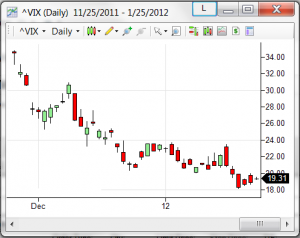 If you pay attention to the financial press, you’ve probably heard the markets described as “volatile” at one point or another. In this context, volatility is not merely descriptive. It has a specific mathematical meaning which can help you make better trading (or for that matter, investing) decisions. In order to succeed as a trader you need to have a strong working understanding of volatility and its implications. Continue reading
If you pay attention to the financial press, you’ve probably heard the markets described as “volatile” at one point or another. In this context, volatility is not merely descriptive. It has a specific mathematical meaning which can help you make better trading (or for that matter, investing) decisions. In order to succeed as a trader you need to have a strong working understanding of volatility and its implications. Continue reading
Monthly Archives: January 2012
The Market Takes The Stairs Up And The Elevator Down
Here’s a tidbit to think about: broad market reactions are not symmetrical. The market doesn’t move down the same way it moves up. Downward moves are generally much larger, faster, and shorter in duration. Upwards moves are slower and more sustained. Continue reading
Additive vs. Multiplicative Thinking About Money
If you think way back to grade school, you may remember that you studied addition and subtraction one year, and then a grade or two later studied multiplication and division. Each pair of arithmetic operators intrinsically go together – they’re opposites of each other (algebraists would say inverses). What I want to explore today is that each pair of arithmetic operators carries with it a means of thinking about numbers, and thus by extension thinking about money. These two means of thinking are both useful but they’re surprisingly distinct, and people frequently make the mistake of applying the wrong type of thinking in a given circumstance. My whole premise here may seem irredeemably nerdy, and it is. But bear with me anyways – I reckon there’s real insight to be had. Continue reading
Guest Post on Las Vegas Tips at Budgeting The Fun Stuff
I’ve got a guest post up over a Budgeting the Fun Stuff on tips for your Las Vegas trip. Enjoy!
Off-Road Finance also appeared in the following carnivals this week:
- Canadian Finance Carnival #71
- Totally Money Blog Carnival #50
- Carnival of Wealth
- Carnival Of Financial Camaraderie #16
Thanks everyone!
Leaving The Middle Class
This is my first new year as part of the financial blogsphere, and the year-end income and balance sheet share-athon took me a little by surprise. Not that I’m opposed to people sharing information about their finances. In “real life” it can cause social friction, but I see little harm in it on the internet – any people you offend will disappear silently into the night. I just didn’t expect it. I do think such disclosure is overall a good thing – it’s entertaining from a voyeuristic perspective, and it’s educational. Enter the obvious question: am I going to share my income? Continue reading
Know Your Instrument
In Defense of Technical Trading
Previously I discussed different divisions within the trading world. One of those divisions is between technical traders and fundamentals traders. I summarized the distinction as:
- Technical traders base their trading decisions on numeric information about the price and trading volume of one or more securities over time. This can include addition information like order book/depth of market (DOM) and tick/time and sales tape information about individual trade executions. Most technical traders use various types of charting and mathematical or visual indicators to make additional sense of this information. Quantitative (“quant”) traders are a subset of technical traders who put more emphasis on sophisticated mathematics to analyze data.
- Fundamentals traders base their trades on economic information, usually betting that over the long run certain known economic relationships will hold. They frequently pay little information to chart studies or previous price and put more emphasis on determining what the price of a security ought to be based on the totality of information about it.
I also mentioned that my personal bias is towards technical trading, although I’ve done both. That’s not to say there’s anything wrong with trading on fundamentals, but technical trading is much more suited to my temperament and skill set.
I’ve come to realize, based on feedback to this blog, that some people have a dislike or distrust of technical trading. Once upon a time this position was common on Wall Street as well, exemplified by the mantra “I’ve never met a rich technician.” Over time, the Street perception has changed, but I still occasionally hear vestiges of the old anti-technical mantra. Now, I have no interest in telling you how you should trade – what you do with your capital is your own business. But I do think technical trading has substantial advantages, particularly for small, non-institutional traders. Here are some of the reasons I prefer it: Continue reading
Profit Factor – A Means of Comparing Strategies
In order to evaluate trading strategies, it’s very handy to have one number that represents how good a given strategy is – bigger is better. I’ve suggested a couple of ways of doing that – win rate and expectation. Both are uselful, but both also have substantial limitations that render them problematic in the real world. What I want to do here is briefly describe those limitations, and then suggest an alternate mathematical construct called “profit factor” you can use for evaluating systems. Continue reading